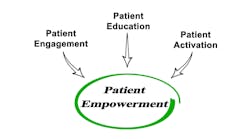Would you buy a used car from me if I said, “Your 2004 Camry will cost you somewhere between $13,995 and $18,845. Sign here, on the dotted line.”
If consumer-directed healthcare (CDHC) continues on its current path, it will fail for two reasons. First, despite all the ballyhoo, single-source portals and Washington-based press statements about transparency, scorecards and empowerment, it is impossible to learn in advance exactly what a medical or surgical procedure will cost.
Would you buy a used car from me if I said, “Your 2004 Camry will cost you somewhere between $13,995 and $18,845. Sign here, on the dotted line.”
If consumer-directed healthcare (CDHC) continues on its current path, it will fail for two reasons. First, despite all the ballyhoo, single-source portals and Washington-based press statements about transparency, scorecards and empowerment, it is impossible to learn in advance exactly what a medical or surgical procedure will cost.
Take your choice: carpal tunnel surgery or colonoscopy. Pick a practitioner, pick an ambulatory surgery center (as if it’s up to you), pick a date (as if it’s up to you), pick an anesthesiologist (ditto), talk to your health plan—and then quote me a single, final and total out-of-pocket cost. Is it $285, $420, $586, $703 or $910? It can’t be done in advance; only after you have been knocked out, invaded, revived, sent home and deluged with paperwork. What portion of that scenario does the phrase “consumer-directed” describe?
Secondly, most consumers aren’t smart enough or motivated enough to demand any more of the healthcare sector. “Demand” is a curious word. Most articles about CDHC use the word in reference to employers, as in, “Only 6 percent of employers now offer consumer-directed health plans, but demand is expected to rise in coming years.” No one writes about consumers with the word “demand” in the same sentence, even when they should demand.
Make no mistake—CDHC means cost-shifting, pure and simple. The person who consumes the healthcare service gets to pay more for it than in the past. CDHC advocates everywhere recite the mantra: When consumers have more financial responsibility and more information with which to make decisions, they will make smart decisions.
Really? Every day consumers buy $2,500 big-screen TVs, $18,000 cars and $320,000 houses they can’t afford. But they know: 1) exactly how much the goods cost; 2) exactly what the monthly payment is; 3) exactly how many months they must pay for. Here’s the flip side of that coin: Hewitt Associates’ 2006 survey of 18,000 employees indicated that 48 percent of employees enrolled in high-deductible health plans (HDHP) wouldn’t make the HDHP choice a second time. That’s huge for a fledgling product with a purportedly blockbuster future. Only 30 percent of HDHP-enrolled employees felt they understood their plan benefits. What part of those results does “consumer-directed” apply to?
Consumers demand to know prices on everything—kitchen renovations, Jeeps, dentures, musical instruments and private school tuition—everything but healthcare procedures. With no demands and no motivation, they follow medical orders, appear at appointed hours and places, and take their chances on both the delivery of the service and their share of the cost.
If we have the information systems—software, hardware and platforms—to essentially interoperate the healthcare sector nationwide, and we do, then certainly we have the IT to determine consumers’ out-of-pocket costs for medical procedures, and post them on Web sites or customize them for patients. What we seem to lack, on everyone’s part, is motivation. It’s easy to see why health plans, hospitals and doctors are lukewarm: Tell the patient up front that his out-of-pocket will be $845, and he might back out. But, patients? Someone ought to rap them upside the head and, at minimum, compel them to ask every provider every time what every procedure costs. Because, after all, what’s more valuable—an intestine, wrist movement or a big-screen TV?

